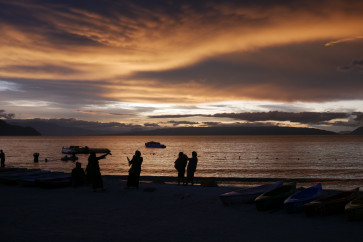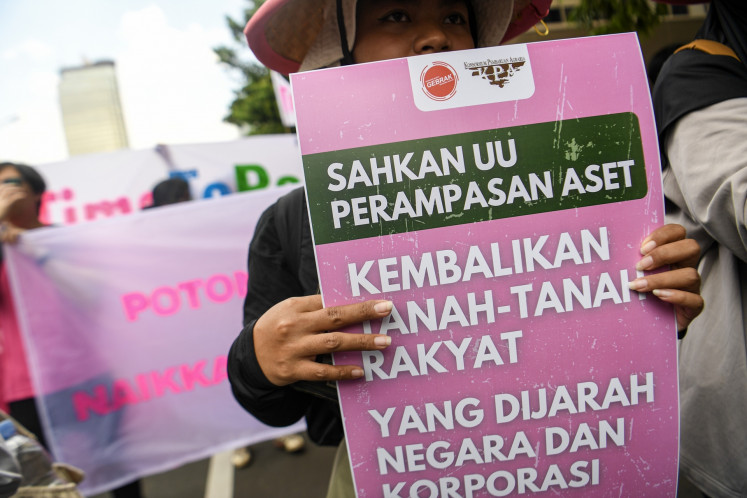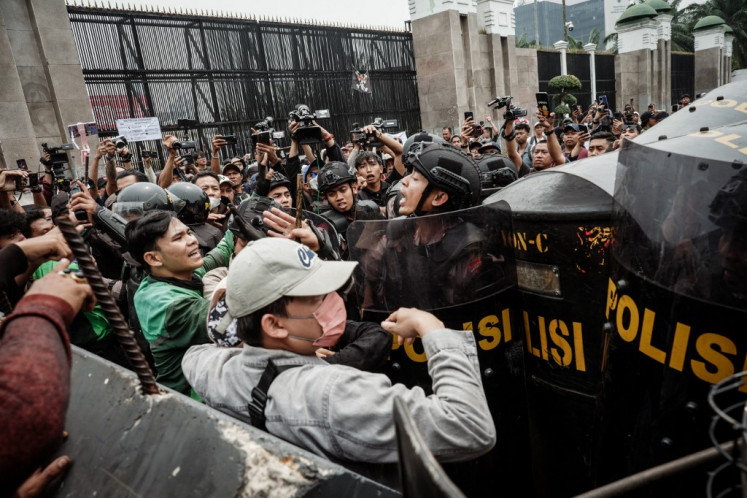Popular Reads
Top Results
Can't find what you're looking for?
View all search resultsPopular Reads
Top Results
Can't find what you're looking for?
View all search resultsReformed Islam: Between hatred and critical thinking
Are Indonesian Muslims committed to a reformed Islam? This question arose during an informal discussion among Indonesian post-graduate students at Harvard’s Science Center cafe recently
Change text size
Gift Premium Articles
to Anyone
A
re Indonesian Muslims committed to a reformed Islam? This question arose during an informal discussion among Indonesian post-graduate students at Harvard’s Science Center cafe recently.
It was not easy to answer that question as they had recently been following the Irshad Manji saga and the increasing threat of Muslim hard-liners in Indonesia.
Along with the hard-liners’ success in failing Lady Gaga’s planned concert in Jakarta, another crucial question was asked: Where is Indonesia heading? No one could answer that question.
Let’s focus on Manji’s ideas about reformed Islam, which has sparked controversy in the Muslim world, including Indonesia and Malaysia.
In fact, most ordinary Muslims have not read Manji’s books, The Trouble with Islam Today (2003) and Allah, Liberty and Love (2011).
Consequently, they easily fall prey to the propaganda of hard-liners. Meanwhile, some Muslim activists have read Manji’s works with uncritical thinking.
There are two ways to respond to Manji’s books. First, those who read Manji’s books with hatred, resulting in ideological prejudice and subjective accounts as they judge the author’s personal identity and sexual orientation.
The reaction of hard-line groups, such as the Islam Defenders Front (FPI) and Majelis Mujahidin Indonesia (MMI), to Manji’s books demonstrates this thinking. Rather than discuss the book, they judge Manji as an avid promoter of homosexuality in Muslim communities.
They are committed to a homophobic mind-set, and the violence against Manji is justified on religious grounds.
Second, those who read Manji’s works based on critical thinking, discussing the strengths and
weaknesses of her ideas with an open mind.
They might disagree with Manji’s ideas and challenge her arguments, but consider violence against her intolerable and religiously unjustified.
The strengths of Manji’s ideas lie in her ability to synthesize personal narrative, the paradox of Muslim societies and deconstruct the sacred Islamic texts. Manji’s approach can be categorized as “ultra-liberal” ijtihad (independent reasoning), promoting the power of reason and construction of fatwa-free lives.
Interestingly, Manji is also committed to using her personal narrative; writing with conversational style and producing her work as an “open letter” to Muslims to fight “the tribal and desert Islam” constructed by Arab cultures.
Noted journalist Thomas Friedman suggests that Manji’s The Trouble with Islam is “critical thinking and self-reflection of a Muslim who is committed to promoting a vigorous and reformed Islam”.
The weaknesses of Manji’s work lie in capitalization of her personal narrative, subject position and offensive arguments in characterizing Muslims within the larger text against “Islamic troubles”.
This includes her self-proclaimed role as a reformer who pretends to “reform” the sacred Islamic texts, particularly deconstructing patriarchal, authoritarianism and anti-human rights tendencies.
Tarek El-Ariss of New York University argues that Manji’s knowledge of Islam is reduced to her personal narrative, calling for Islamic reform by her identification as a “Muslim refusenik”, promoting her “theoretical model” of ijtihad for liberating Muslims based on Western and secular traditions (The Muslim World, January 2007). Clearly, Manji is committed to the “Westernization of Islam as a liberating force on Islam and Muslims”.
Meanwhile, Manji’s overwhelming sympathy to US foreign policy in the Middle East and Israel is biased and uncritical.
Not surprisingly, Nahdlatul Ulama (NU) and Muhammadiyah leaders are not willing to respond to Manji’s books, although they condemn the acts of violence against her.
There are two possible reasons for this. First, they might consider a discussion about the book problematic due to Manji’s ultra-liberal approach, despite rejecting the opinions of hard-liners.
These are common tendencies for moderate Muslim leaders in the world. In her Allah, Liberty, and Love, Manji criticizes them as “orthodox Islam” who often obstruct liberal democratic values. Manji claims that such attitudes legitimize militant Islamist acts.
Second, moderate Muslim leaders might consider a discussion about Manji’s books as counterproductive, thinking that homosexuality is strictly prohibited in the Koran and hadith. So far, there has been no significant debate to counter this textual position.
There are several ultra-liberal Muslim activists who hold the opinion that Islam respects homosexuality and same-sex marriage is justified. However, moderate Muslim leaders mostly reject this argument, while other liberal Islam proponents do not endorse it.
Tariq Ramadhan, a noted modernist Muslim thinker from Switzerland, suggests that Islam does not promote homosexuality. He says that it is rejected in principle since it does not correspond to the divine project established for all human beings.
However, he will fight against homophobic discourses or attacks. Moderate Muslims could use this
as a reference, regardless of their disagreement with Manji’s ultra-liberal ideas. At least they should speak up in countering violence against Manji.
Finally, we are pleased that despite facing threats and receiving awful treatment from hard-liners, Manji is still optimistic about the future of Indonesian Islam as she recently stated in The Jakarta Post. To Manji and other liberal Islam proponents, I would suggest that the reformed Islam not only needs the power of reason, but also wisdom.
The writer is a senior research fellow at Harvard Kennedy School, Ash Center for Democratic Governance and Innovation, Cambridge, Massachusetts, the US.










